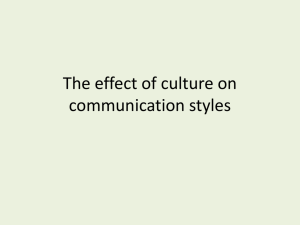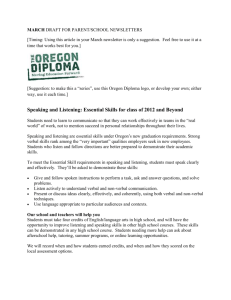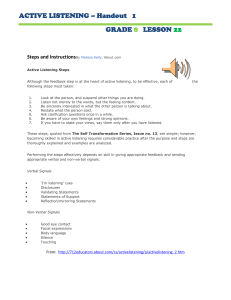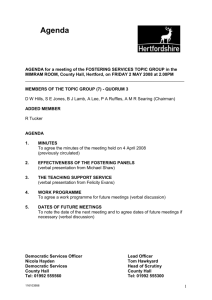Communication Skills & Doctor-Patient Relationship
advertisement
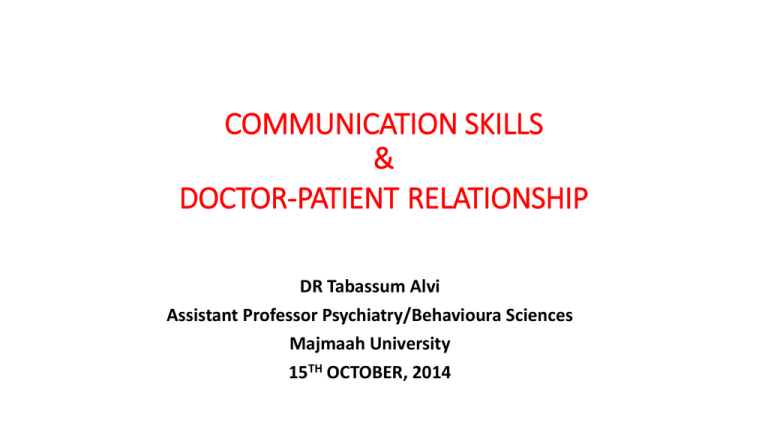
COMMUNICATION SKILLS & DOCTOR-PATIENT RELATIONSHIP DR Tabassum Alvi Assistant Professor Psychiatry/Behavioura Sciences Majmaah University 15TH OCTOBER, 2014 What and why Oh my Sustainer! Open my heart and Make my task easy for me And loosen the knot from my tongue So that they might understand my Speech Surah Taha (16:25-29--Al Quran M A P S O F O U R M I N D OUTLINE • Objectives • Definition • 7 Cs • Types • Doctor patient relationship • Fundamental elements • Partnership with patient • Improving communication OBJECTIVES At the end of session students should be able to 01. Explain the basic principles of communication skills 02. Discuss the role doctor patient relationship in clinical care DEFINITION “The imparting or exchange of information by speaking, writing or using any other medium” APT (2002), vol. 8, p. 166 Communication Model Context ( Sender Thought Process What, When, Why, Whom, where & How Encoder stimuli) Message (Medium) Verbal & Non Verbal Receiver Thought process Taking meaning out & Plan to respond decoder 7 Cs 1. 2. 3. 4. 5. 6. 7. Clear Concise Concrete Correct Coherent Complete Courteous TYPES • Verbal • Nonverbal • Written WHAT IS MORE IMPORTANT? Types of communication Verbal Non verbal Symbol Based Gesture Based Largely Learnt Largely Innate Consciously Controlled Partial Control Higher Risk of Deception Relatively Uncontaminated WHY IN MEDICINE? Communication error leads to 60% to 70% of preventable hospital deaths (The Joint Commission on Accreditation of Healthcare Organizations) DOCTOR-PATIENT RELATIONSHIP FUNDAMENTAL ELEMENTS • Right to receive information • Right to make decisions • Right to courtesy, respect, responsiveness, and timely attention • Right to confidentiality • Right to continuity of health care • Right to have available adequate health care (Issued June 1992 based on the report "Fundamental Elements of the Patient-Physician Relationship) PARTNERSHIP WITH PATIENT • Polite and considerate • Treat patients as individuals(holistic model) • Treat patients fairly • Work in partnership with patients regarding: • Condition, its likely to progression and the options for treatment, including associated risks and uncertainties • The progress of their care, and your role and responsibilities in the team • Who is responsible for each aspect of patient care PARTNERSHIP WITH PATIENT • You must support patients in caring for themselves • Not pursue a sexual or improper emotional relationship with a current patient • Be aware of risk involved in social media (http://www.gmc-uk.org/guidance/good_medical_practice/partnerships.asp) IMPROVING COMMUNICATION • Call by name • Not just the illness! • Minimize distractions • Engage in active listening • Concrete feedback • Culturally responsive care ACTIVE LISTENING • Sit squarely in front of patient • Attentive posture • Nodding • Active questions and answer. • Use Para linguistics • Eye contact • Matching facial expression • Level of seating • Environment IMPROVING COMMUNICATION • Assessing your own biases • Expect resistance to change • Highlight the positives • Don’t just write an order • Clarify before you end interview • Pain is not always physical! Guidelines to Effective Listening • Listen for emotions • Avoid jumping to conclusions • Observe the congruence between the verbal and non-verbal • Practice listening • Limit your own talking • Be patient • Concentrate Information Care The Essential Questions • What is wrong with me? • Is there a risk of the illness spreading to those around me or passing • it to my off-springs? • Is there an effective treatment for my problem? • Is the treatment safe / are there any serious side effects or dangerous • effects of the treatment (drugs, interventions, surgery etc), effects on sex, appetite, sleep, weight etc……Alternative treatments • Alternative treatments available? • How long will I take to recover? • Is there any abstinence? Basic steps in informational care • Patient’s knowledge and expectations must be assessed prior to and after the communication of significant information to see what and how much has been retained. • Evidence Based Facts should be provided. • Positive and negative effects of medicine expressed. • Avoid false hopes. • Discuss prognosis of disease in range. • Summarize • Check for information retained. Assignment Write a learning agreement showing how principles of interpersonal skills can be applied to daily activities THANK YOU
